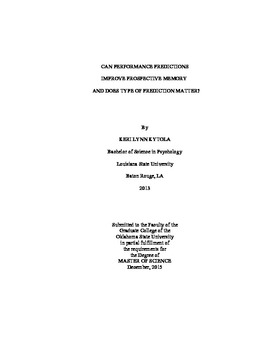| dc.description.abstract | The purpose of the current study was to investigate the extent to which memory beliefs (as indexed by performance predictions) affected prospective memory (PM) performance on tasks that had different retrieval processing demands. Participants were randomly assigned to a prediction condition (single-item prediction, multi-item prediction, no prediction) and a PM condition (focal or nonfocal PM task). During the experiment, participants completed a lexical decision task (LDT) that required making word judgments about letter strings. Participants then predicted their future PM performance and completed a distractor task before carrying out the PM task which was embedded in the LDT. PM performance was scored as the proportion correct out of eight possible opportunities. Given that recent research that has suggested that making predictions about one�s future PM performance may serve as an effective strategy to improve actual PM performance (Meeks, Hicks, & Marsh, 2007; Rummel, Kuhlmann, & Touron, 2013), both single-item and multi-item predictions were expected to have a beneficial impact on actual PM performance. However, multi-item predictions were hypothesized to be more effective than single-item predictions for improving PM performance, especially on the nonfocal PM task. Results demonstrated that predicting performance did not significantly impact actual performance on focal or nonfocal PM tasks. On the other hand, performance was better on the focal PM task than on the nonfocal PM task indicating that cue focality did significantly impact PM performance (Einstein et al., 2005; Kliegel, J�ger, & Phillips, 2008; McDaniel & Einstein, 2000). While predicting performance was anticipated to increase monitoring processes for the PM task at a cost to performance on the ongoing LDT, the data did not demonstrate this pattern. Finally, whereas predicting performance using a multi-item scale was expected to help individuals better understand the demands of the PM tasks, the data revealed that participants were more accurate in postdicting their past PM performance than in predicting their future PM performance. These findings suggest that performance predictions may not always be useful to employ as a strategy to improve PM performance. Implications of these findings are discussed. | |
